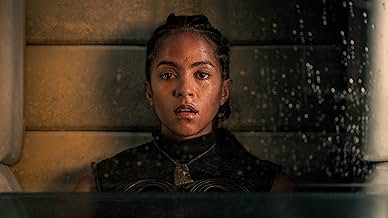A complex saga of humans scattered on planets throughout the galaxy all living under the rule of the Galactic Empire.A complex saga of humans scattered on planets throughout the galaxy all living under the rule of the Galactic Empire.A complex saga of humans scattered on planets throughout the galaxy all living under the rule of the Galactic Empire.
- Nominated for 2 Primetime Emmys
- 3 wins & 29 nominations total
Browse episodes
Summary
Reviewers say 'Foundation' is a visually impressive sci-fi series with strong performances, especially from Lee Pace and Jared Harris. However, it faces criticism for significant deviations from Isaac Asimov's original books, including changes in character genders and storylines. Some viewers appreciate the modernization, while others feel it loses Asimov's essence. The series is lauded for its production values and epic scope but faulted for inconsistent writing and pacing. Non-book readers tend to enjoy it more, while original fans express disappointment.
Featured reviews
I do not count myself an Asimov expert, nor had I been a big Foundation series fan during the first 2 seasons (though I did watch them). But this 3rd season has really caught my attention. Not meant as a knock on any of the prior show-runners or writers (I'm not familiar with the in's and out's within the prior production team(s)) but what I can say, being a sci-fi fan and television follower generally, is that Roxann Dawson is stellar behind the screen as a director and producer. Both in sci-fi/fantasy and more mainstream programming. While I thought she was great in Voyager as B'Lana, her work since behind the camera has been quite notable. And each time she gets involved with a series, like she has here, it thrives. Just sayin.
Foundation offers a visually engaging journey through a sprawling sci-fi universe, with scenery that helps establish its futuristic settings quite effectively. While not always flawless, the production design and visual effects create a believable world that supports the story without overwhelming it.
The storytelling is ambitious, adapting Isaac Asimov's complex saga into a layered narrative that sometimes feels dense but often succeeds in keeping viewers intrigued. The pacing can be uneven, but the series generally manages to balance its big ideas with character-driven moments, which adds some emotional weight.
Acting performances vary, with the lead delivering a solid portrayal that grounds the show's more abstract concepts. Some supporting actors bring welcome depth, though a few characters come off as underdeveloped, leaving their motivations a bit unclear.
Where the show stumbles most noticeably is in its approach to casting. There's a clear, almost mechanical attempt at ticking demographic boxes, which occasionally undermines the authenticity of the world. In a galaxy where faster-than-light travel and psychohistory are accepted without question, the most jarring fiction ends up being the idea that every institution and culture has been carefully curated for maximum contemporary optics. Rather than feeling inclusive, it often feels oddly artificial - like a diversity committee crash-landed on Trantor. Representation matters, but subtlety matters too.
Overall, Foundation is a thoughtful and occasionally compelling adaptation that sci-fi fans might appreciate for its ideas and setting. It's not without its flaws, but it carves out a respectable place among contemporary science fiction series.
The storytelling is ambitious, adapting Isaac Asimov's complex saga into a layered narrative that sometimes feels dense but often succeeds in keeping viewers intrigued. The pacing can be uneven, but the series generally manages to balance its big ideas with character-driven moments, which adds some emotional weight.
Acting performances vary, with the lead delivering a solid portrayal that grounds the show's more abstract concepts. Some supporting actors bring welcome depth, though a few characters come off as underdeveloped, leaving their motivations a bit unclear.
Where the show stumbles most noticeably is in its approach to casting. There's a clear, almost mechanical attempt at ticking demographic boxes, which occasionally undermines the authenticity of the world. In a galaxy where faster-than-light travel and psychohistory are accepted without question, the most jarring fiction ends up being the idea that every institution and culture has been carefully curated for maximum contemporary optics. Rather than feeling inclusive, it often feels oddly artificial - like a diversity committee crash-landed on Trantor. Representation matters, but subtlety matters too.
Overall, Foundation is a thoughtful and occasionally compelling adaptation that sci-fi fans might appreciate for its ideas and setting. It's not without its flaws, but it carves out a respectable place among contemporary science fiction series.
To me Brother Day played by Lee Pace has become as enjoyable to watch as Daenerys played by Emilia Clarke in GOT. There's a lot of confusing, boring bits and vexing characters in the show but Brother Day keeps me coming for more.
Overall it's a quality show albeit flawed. But there's a lot of unique, and daring approach that still make this show worth a watch. Every scene and every new information that is revealed about Cleons is so engaging and interesting.
If you're into sci-fi I'd definitely recommend trying this show and giving it a shot at least till season two because it actually even improves in the second season.
Overall it's a quality show albeit flawed. But there's a lot of unique, and daring approach that still make this show worth a watch. Every scene and every new information that is revealed about Cleons is so engaging and interesting.
If you're into sci-fi I'd definitely recommend trying this show and giving it a shot at least till season two because it actually even improves in the second season.
I remember watching the first couple episodes and not being very impressed. Not necessarily hating it, but not intrigued. It felt like a very traditional sci-fi series, akin to dune or star wars. A year or two later, i tried watching again... and now i'm somehow roped in and invested and binged most of the show well into 4 in the morning.
Great visual effects, music, vfx, product and costume design, even acting. Really intriguing clone concept (and a very obvious anagram for Cleon). Fantastic world building and i appreciated the non-linear storytelling. Interested to see where this series will take us!
Great visual effects, music, vfx, product and costume design, even acting. Really intriguing clone concept (and a very obvious anagram for Cleon). Fantastic world building and i appreciated the non-linear storytelling. Interested to see where this series will take us!
Foundation is definitely a must watch for any sci-fi fan. I never read the source material and it seems that most of the people who don't like this are mad because it's not exactly like the book. Some people don't understand that these shows and movies are adapted or based off the source material. Some parts are a little slow and throws the pace off a little as it builds its world but not slow enough where it makes it bad. The visuals are as good as anything you'll find on tv. You can tell they put a lot of money into it and it shows. This also has some great characters that will make you invested in the show and actually care about what happens to them. Foundation has ended up surprising me then just about any show that I can remember. It really has become one of my favorite sci-fi shows that I've ever seen.
Did you know
- TriviaAsimov's Foundation was originally published as a short story series in Astounding Magazine between May 1942 and January 1950, based on ideas in Edward Gibbon's History of the Decline and Fall of the Roman Empire.
- Crazy creditsThe opening titles is a montage of radiant energy particles forming various shapes.
- ConnectionsFeatured in Late Night with Seth Meyers: Paul Rudd/Jared Harris/Nate Smith (2021)
Details
- Runtime
- 1h(60 min)
- Color
- Aspect ratio
- 2.00 : 1
Contribute to this page
Suggest an edit or add missing content







































